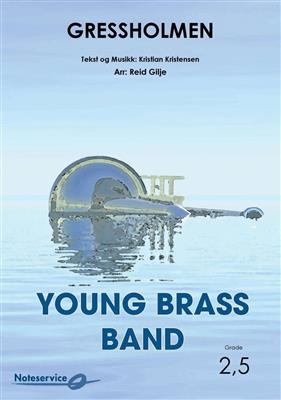Results
-
 £115.60
£115.60En bitte liten funklende stjerne - Numme
This song written by Yngvar Numme and Benny Borg was made popular by Norwegian group Dizzie Tunes on one of their Christmas-albums. This arrangement is based on the Dizzie Tunes version and features the original solo for trumpet or cornet. The Drum Set part is optional so one can perform the arrangement without this part.
Estimated dispatch 5-14 working days
-
 £115.60
£115.60Born to be Wild - Mars Bonfire
This arrangement of "Born to be wild" is based on the song by the band Steppenwolf recorded late in the 1960's. Young musicians can be featured as soloists, using their voice and the instrument. The arrangement also works very well without soloists.
Estimated dispatch 5-14 working days
-
 £127.30
£127.30Abide With Me - William Henry Monk
This arrangement of "Abide with me" slightly differs from the traditional representation of the hymn. The piece has a majestic introduction based on elements from and around the hymn. Furthermore, the theme is presented in a more familiar way, first in low brass and then tutti. The ending then reverts to the expression from the opening. This arrangement may fit in many concert programs, but is perhaps ideally suited for church concerts.
Estimated dispatch 5-14 working days
-
 £115.60
£115.60Ubi Caritas - Thomas Caplin
Thomas Caplin is a Swedish professor of choral conducting. He works at the Inland Norway University of Applied Sciences in Hamar. He composed this beautiful opus for choir based on the ancient text Ubi caritas.The text is often used during Maundy Thursday, describing Jesus washing the feet of his disciples: Where charity and love are, there God isIn this arrangement, a smaller group of players are soloists. The arrangement will work well if the group can be placed on a gallery or at the back of the concert hall.
Estimated dispatch 5-14 working days
-
 £105.20
£105.20Gressholmen - Kristian Kristensen
"Gressholmen" (in English "Grass-Islet") is a beautiful melody written by Norwegian singer/songwriter Kristian Kristensen.This arrangement is done in the same vocal character and style as the original recording. Please listen to this to find the best possible atmosphere and style.Best possible timbre and phrasing is two of the most important elements when performing this arrangement.
Estimated dispatch 5-14 working days
-
 £115.60
£115.60Humlens flukt - Nikolai Rimaky-Korsakov
This arrangement of Rimsky-Korsakov's famous piece "Flight of the Bumblebee" was originally written for tuba soloist (!) And concert band, commissioned by Lilleaker skoles musikkorps.The target group for this arrangement are bands who want to show off a virtuoso instrumental soloist, without having to spend a lot of time on the accompaniment parts. Unlike other arrangements of this piece, virtually all of the technical challenges lie in the soloist's part.
Estimated dispatch 5-14 working days
-
 £127.30
£127.30I Believe - Eric Levisalles
I Believe is a beautiful ballad composed by Eric Levisalles.This arrangement is written for Flugelhorn and Euphonium as soloists with Brass band.You might very well listen to the recording by Andrea Bocelli and Cecilia Bartoli to get an impression of mood and character.This arrangement was done at the end of the corona pandemic and performed for the first time on February 12th 2022, the same day as Norway re-opened after nearly two years of corona-restrictions.
Estimated dispatch 5-14 working days
-
 £29.95
£29.95A Little Prayer - Evelyn Glennie
Originally composed for solo marimba, this popular version of A Little Prayer was made in 1998 following Evelyn Glennie's collaboration with Black Dyke Band during the recording of their Grammy nominated Reflected in Brass CD. Robert Childs, then principal euphonium with Black Dyke, requested Evelyn's permission to make the arrangement for his son, David. The composer obliged, and Robert presented the score and parts to his son as a seventeenth birthday present. Evelyn Glennie revealed: "When I wrote this chorale for marimba, it expressed my spiritual feelings and displayed a pleasantly relaxed dimension of the instrument. Over the years my exposure to brass bands has filled me with wonder; their musical diversity is considerable. I had no hesitation in giving A Little Prayer to Robert Childs to bring this little melody to life." Having composed the work when she was only 13, Evelyn continued: "As a child I would never have believed that such a short and simple piece of music, would come to grow this much. A little Prayerserves to prove that one should always bet their chips on what they believe in, for nine out of ten it will be worth it!" After twenty years of exclusivity, Prima Vista Musikk is proud to make this beautiful arrangement available to all. A Little Prayer provides the perfect reflective interlude for concert or devotional use by euphonium soloists and bands of all abilities.
Estimated dispatch 5-14 working days
-
 £60.99
£60.99The Call of the Shepherd - Edvard Grieg
A warm, romantic "pastorale", very suitable as calm interlude in your program. John Brastad, band master of the Bergen Salvation Army Band ((Norway) made the arrangement for brass band. Een warme, romantische 'pastorale', zeer geschikt als rustpunt in uw programma. John Brakstad, bandmaster van de Bergen Salvation Army Band ((Noorwegen)maakte het arrangement voor brassband.
Estimated dispatch 5-14 working days
-
 £69.99
£69.99Meeting - Edvard Grieg
A lyrical piece, from Edvard Grieg's song-cycle "Haugtussa" ( The Mountain Maid) originally for voice and piano, but here in an arrangement for Soprano Cornet and Brassband by Tom Brevik Een lyrische werk van Edvard Grieg uit de liederencyclus ""Haugtussa"" (The Mountain Maid),oorspronkelijk voor stem en piano, maar hier in een arrangement voor Es Cornet en Brassband van Tom Brevik.
Estimated dispatch 5-14 working days
